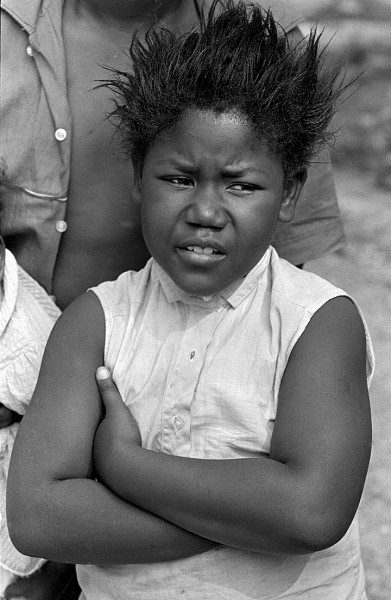 Here’s part of the Smelterville project I’ve been working on since the middle ’60s. I was lucky enough to track down Rose DePree in the summer of 2011 to see what she remembered about growing up in South Cape, as The Missourian called it.
Here’s part of the Smelterville project I’ve been working on since the middle ’60s. I was lucky enough to track down Rose DePree in the summer of 2011 to see what she remembered about growing up in South Cape, as The Missourian called it.
[Editor’s note: an earlier version of this post contained an embarrassing error: even though I had interviewed Rose DePree in 2011, someone identified her as Ruth Depree in the 1967 photographs, so I didn’t go back to check my notes. There’s a chance there will be more people misidentified because I’ve been given different names for some subjects by different people. Memories fade and kids look different than remembered. I’m sorry for the error.]
Didn’t know we were poor
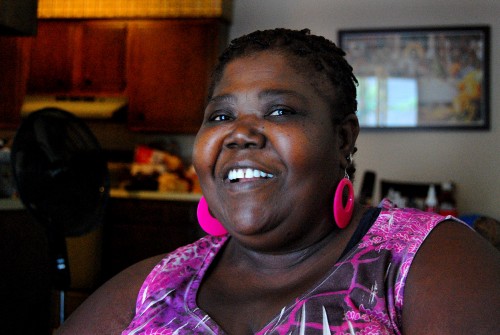 I don’t really remember bad things. I just remember that we were all one family. It was totally different than it is today. We couldn’t address an adult by their first name. It was either Miss, Auntie or Uncle. I just remember having fun. I don’t remember bad things. I didn’t even remember we were this poor until I saw the pictures.
I don’t really remember bad things. I just remember that we were all one family. It was totally different than it is today. We couldn’t address an adult by their first name. It was either Miss, Auntie or Uncle. I just remember having fun. I don’t remember bad things. I didn’t even remember we were this poor until I saw the pictures.
Three-bedroom shotgun house
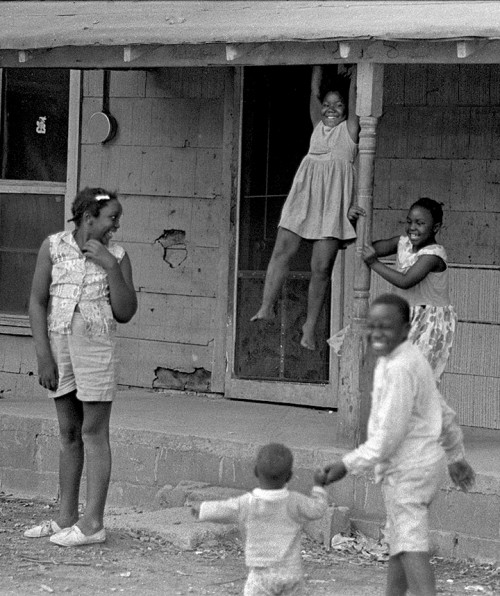 There was ten of us. My oldest brother worked in St. Louis, but he’d come back on the weekend. The rest of us lived right there. It was a shotgun house. There was two bedrooms in that house, I believe. No, there were three bedrooms in there. All of the girls slept in one bedroom, and all the boys slept in a room, then my mother had a room.
There was ten of us. My oldest brother worked in St. Louis, but he’d come back on the weekend. The rest of us lived right there. It was a shotgun house. There was two bedrooms in that house, I believe. No, there were three bedrooms in there. All of the girls slept in one bedroom, and all the boys slept in a room, then my mother had a room.
We had a wooden stove. We might have had lights, maybe, eventually, but we started off with oil lamps. I remember the wooden stove. Mama would get up early – or one of my brothers – and make sure the wood was in the stove, and get the house warm so the rest of us kids could get up in the morning.
I remember we took a bath in this big round tub. That’s how we took baths. We had an outside toilet. I was always the chicken. I didn’t like to go outside at night, so Mama would always have to go outside with me ’cause I wouldn’t go on out there at night. I don’t really remember if we had running water in the house. I don’t think we did. I’m pretty sure just about everyone had a pump in the back of their house. When you’d go out the back door, you’d have your pump, then a little further out, you’d have your outhouse. We didn’t know what toilet paper was. We used brown paper bags.
[That’s Rose swinging. The other children are Leonora “Honeycone” Beal, Andy Lyons and Beatrice “Bea” Wren. The baby is unidentified.]
Cape was very segregated
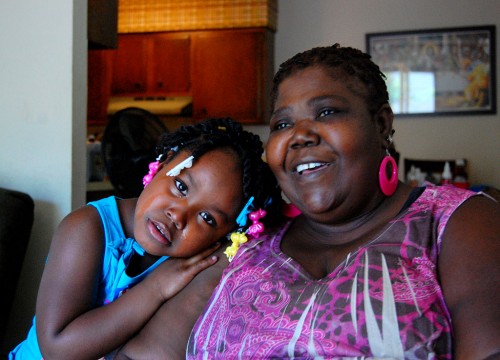 Cape was very segregated. Very. Very. I remember when Martin Luther King got killed in Memphis, All the black families, it touched them. They came up to the school. I didn’t know what was going on; all of the parents came up and took us out of school. I remember my mother crying. We really didn’t associate with white folks like we do now… I didn’t really start being friends with white people – you know, children my age – until I was in about the 5th or 6th grade.
Cape was very segregated. Very. Very. I remember when Martin Luther King got killed in Memphis, All the black families, it touched them. They came up to the school. I didn’t know what was going on; all of the parents came up and took us out of school. I remember my mother crying. We really didn’t associate with white folks like we do now… I didn’t really start being friends with white people – you know, children my age – until I was in about the 5th or 6th grade.
In the 6th grade, my best friend was [unknown], and she was a white girl. But, I know her father was really prejudiced. When I’d go over to her house, she’d always want me to spend the night. I heard him tell her one day, “No nigger ain’t staying in here.” I went home and told my mama. She said, “That’s the way white folks look at us. Don’t you EVER, EVER, if she ever asks you to spend the night again, you tell her ‘No.’ It ain’t nothing against the child, but with the parent feeling that way, I wouldn’t feel good about you staying there.”
When we moved up on college street, there were black and white families and we all played together. My best friend was Clara; I went to her house and her mother never acted like that or nothing. As far as she was concerned, we were just a child., you know. Kids these days don’t know nothing about prejudice. You’ve got some that have messed-up families, that still have that mentality.
[Rose is pictured with her granddaughter, Ja’Nya Brand.]
It’s all gone
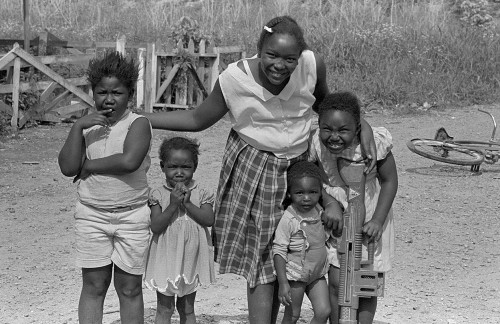 I didn’t remember we had street buses. My mom said she used to pay a dime to come up town to work, to clean houses and stuff.
I didn’t remember we had street buses. My mom said she used to pay a dime to come up town to work, to clean houses and stuff.
I remember the Sterling store because when my momma got paid, she used to alway try to give us a nickel or a dime and we’d go to the Sterling store to shop, you know, downtown.
It’s all gone. There used to be a whole community there.
[Pecan Street youngsters: Rose, Alice Depree, Leonora Beal, Sheila Wren and Beatrice Wren. Click on the photos to make them larger.]
Earlier Smelterville stories
- Smelterville 1967: where are they?
- A church in Smelterville
- I found Billy and Margaret
- Another cleanup
- Lohmann Fixture Company
- A 1929 railroad bridge in Smelterville
- Consolidated Grain and Barge
- Faye Powders discovers her mother
- Clinton Wren remembers Smelterville
